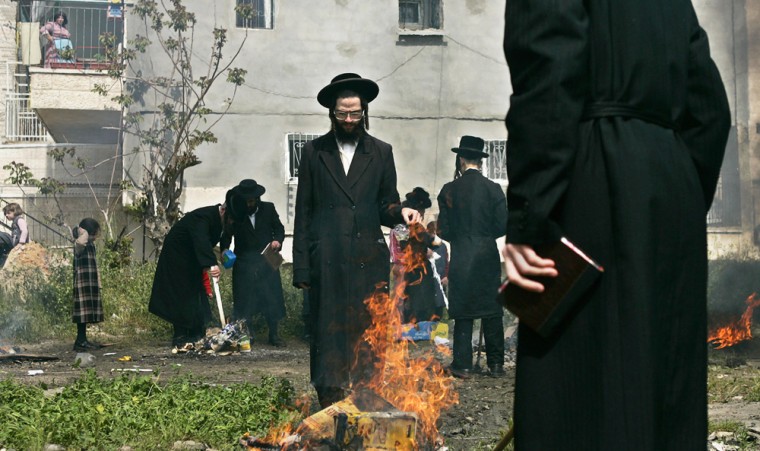With the Palestinian territories sealed off and armed guards posted at synagogues, Jews gathered Wednesday for the ritual Passover meal that commemorates the flight of the ancient Israelites from bondage in Egypt.
During the weeklong Passover holiday, observant Jews eat matzo — unleavened bread — to illustrate how the Israelites had no time to let their bread rise as they fled.
Israeli security forces were put on high alert for the duration of the holiday, with some 13,000 troops deployed across the country to prevent possible attacks by Palestinian militants. Security forces have received more than 80 warnings about planned attacks, somewhat higher than the usual level, media reported.
The police commissioner, Moshe Karadi, said each synagogue would have at least one armed guard, and police would be posted at hotels where many Israelis were attending Passover meals after sundown Wednesday.
Four years ago, a Palestinian suicide bomber killed 29 Israelis at a ritual Passover dinner in a hotel in the coastal town of Netanya.
So the Israeli military also enforced a blanket closure of the West Bank and Gaza, barring all Palestinians from entering Israel.
Big travel days
For Israelis, Passover is a time of travel and family get-togethers. More than 800,000 Israelis, or more than one-tenth of the population, were expected to travel abroad in the coming week, Israel TV said. Many of those staying in the country planned to attend festivals or take short trips.
In the preparations for Passover, religious Jews scoured their homes and rid their pantries of forbidden food items. Smoke wafted through the air of Jerusalem and other towns across the country Wednesday morning as people burned bread and other leavened foods in communal bonfires. Piles of charred bread were still smoldering in Jerusalem’s Makor Baruch neighborhood in the early afternoon.
The Internet offered a wide variety of sites for those who put a premium on convenience when carrying out the ceremonial custom of “selling” nonperishable forbidden food to a non-Jew, for “repurchase” after the holiday. Faxing sale transaction requests through a religious intermediary was another option.
Government goes low-tech
The government took the low-tech route. Israel’s chief rabbis, in keeping with state tradition, sold the country’s leavened foods to an Israeli Arab from a suburban Jerusalem town Tuesday for a $4,350 down payment. The man will sell the food back to the state after the holiday ends, and the buyer will have his money reimbursed.
Ahead of the holiday, media reported heavily on the growing poverty in Israel, and soup kitchens and not-for-profit groups were busy Wednesday handing out the last of holiday meals to tens of thousands of destitute Israelis.
Israel’s economy grew more than 5 percent in 2005, but many of Israel’s disadvantaged, hurt by deep cuts in the government’s social spending, didn’t feel the upturn.
